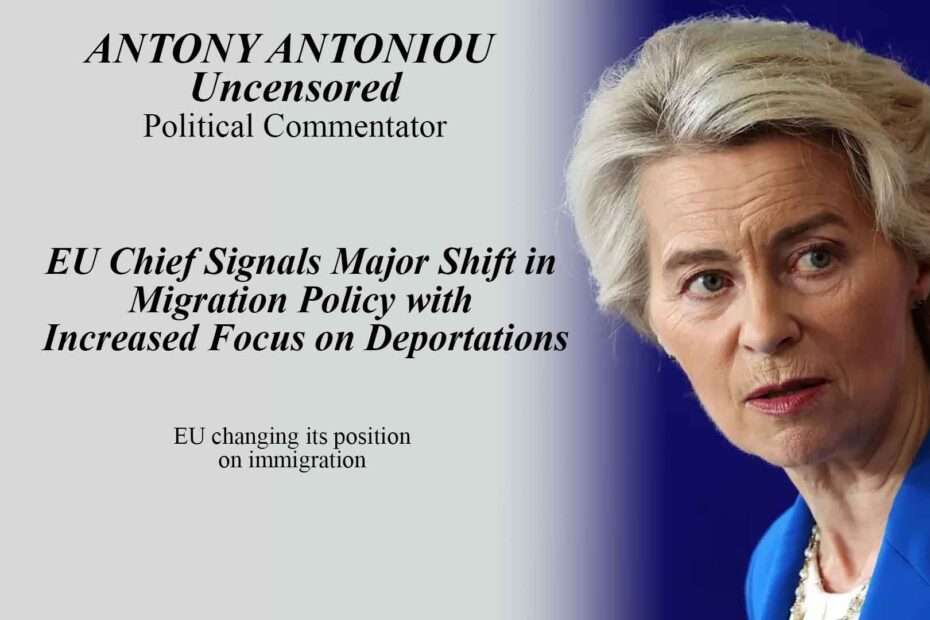EU Chief Signals Major Shift in Migration Policy with Increased Focus on Deportations
European Commission President Ursula von der Leyen has announced that the EU could “draw lessons” from Italy’s controversial policy of processing migrants offshore in Albania, as leaders of the 27 member states convene for a crucial EU summit centred on migration challenges.
In a comprehensive letter addressed to EU leaders ahead of the Brussels summit, von der Leyen revealed that the EU’s executive arm would be putting forward new legislative proposals aimed at substantially increasing deportations of migrants who have entered member states irregularly.
Italian-Albanian Agreement Takes Effect
The implementation of Italy’s ground breaking agreement with Albania commenced earlier this week, marking a significant shift in European migration management. The initial transfer involved sixteen men to a processing centre in the Albanian port of Shengjin. However, complications emerged shortly after their arrival when it was discovered that four of the individuals required immediate return to Italy—two were identified as minors, whilst the other two were found to have medical vulnerabilities that precluded their processing in Albania.
The Italian-Albanian arrangement, which has come at a considerable cost of approximately €650m (£547m), has faced numerous setbacks and delays. Originally scheduled to commence operations last spring, the processing centres, wholly funded by the Italian government and operating under Italian jurisdiction, will serve as temporary accommodation for migrants whilst their asylum applications are reviewed by Italian authorities. The scheme explicitly excludes several categories of individuals, including pregnant women, children, and those deemed vulnerable.
Wider European Response
The initiative has sparked considerable interest across the European Union, with several member states actively exploring similar arrangements with third countries. In a notable development, the Dutch government disclosed on Wednesday that it was actively considering a proposal to relocate rejected asylum seekers to Uganda.
Von der Leyen’s focus on migration appears to be a direct response to mounting pressure from across the continent. In her detailed communication to member states, she highlighted a stark statistic: the current return rate for irregular migrants from EU countries stands at merely 20%, indicating that four-fifths of individuals ordered to leave EU territory successfully evade deportation.
Political Backlash and Support
The Italian scheme has drawn sharp criticism from various quarters. Riccardo Magi, representing the left-wing +Europa party, denounced the arrangement as “cruel, useless and expensive.” The humanitarian organisation Doctors Without Borders expressed grave concerns, suggesting the scheme would likely result in “further harm and violation of human rights.” Local civil rights campaigners in Albania made their opposition visible, displaying a poignant banner declaring “The European dream ends here” near the newly established processing centre in Shengjin.
However, Italian Prime Minister Giorgia Meloni, leading the right-wing government, has steadfastly defended the initiative. Addressing Parliament, she characterised the plan as “a new, courageous, unprecedented path” that she maintained “perfectly reflected the European spirit.”
Broader European Context
The implementation and outcomes of the Albania agreement are being closely monitored by numerous EU member states, many of which have recently adopted more stringent approaches to migration in response to rising support for far-right political movements. Recent developments across Europe illustrate this trend:
– Germany has reinstated checks along its land borders
– France has begun exploring more restrictive immigration legislation
– Poland has announced plans to temporarily suspend asylum rights for border crossers
Polish Prime Minister Donald Tusk justified the controversial measure as necessary to prevent Belarus from “destabilising” Poland through the facilitation of large-scale migration flows.
Recent Incidents Fuelling Policy Shifts
Recent tragic events in France and Germany have intensified calls for stricter immigration enforcement. In Solingen, Germany, a Syrian failed asylum seeker committed a fatal attack, resulting in three deaths. Similarly, near Paris, a Moroccan national was responsible for the murder of a young student. Both perpetrators had been subject to unenforced expulsion orders, highlighting systemic challenges in implementing deportation decisions.
Continental Coordination
In a demonstration of growing consensus on the need for reform, fifteen member states have endorsed a joint proposal spearheaded by Austria and the Netherlands, aimed at enhancing the “efficiency” of the EU’s deportation mechanisms. This collaborative approach suggests a broader shift towards more coordinated and stringent migration management across the continent.
Von der Leyen’s proposal emphasises the importance of mutual recognition of deportation decisions among member states, arguing that this would prevent migrants from exploiting systematic vulnerabilities to avoid return orders issued in one country by relocating to another EU member state.
This comprehensive reform initiative represents one of the most significant shifts in EU migration policy in recent years, potentially setting the stage for a fundamental transformation in how the bloc manages irregular migration and processes asylum claims.

